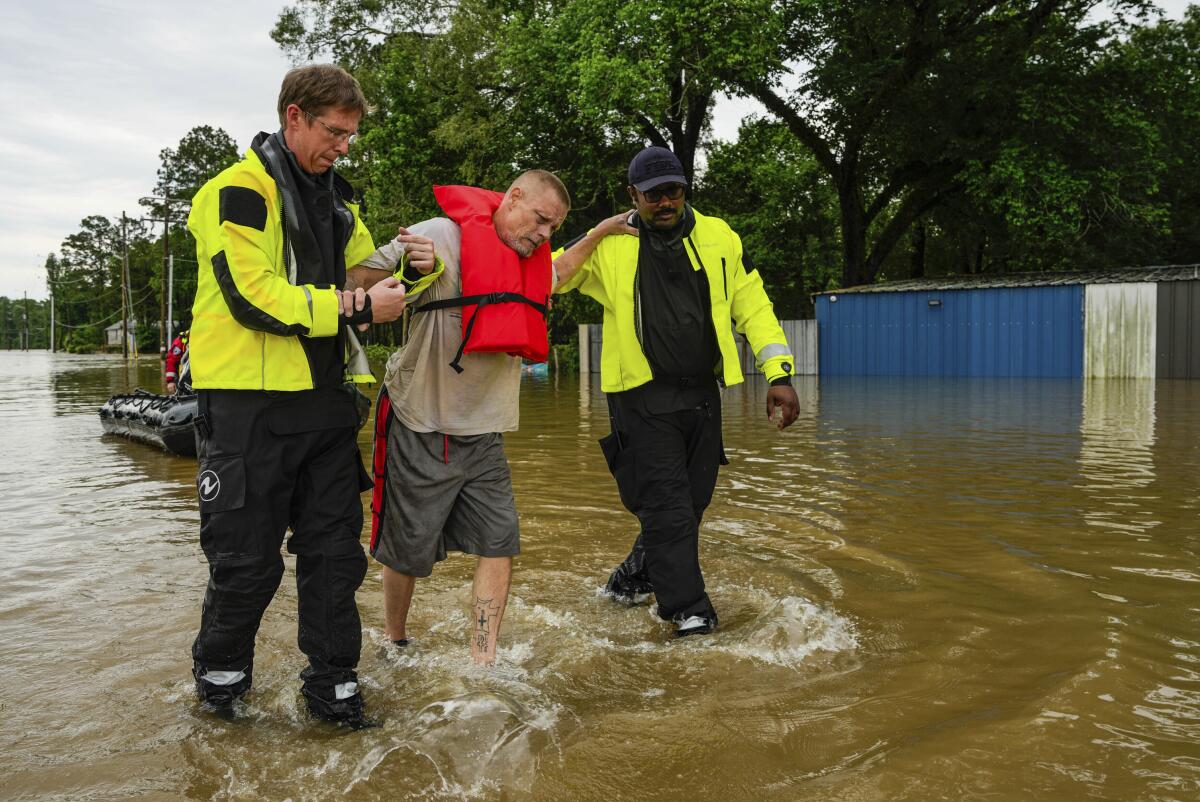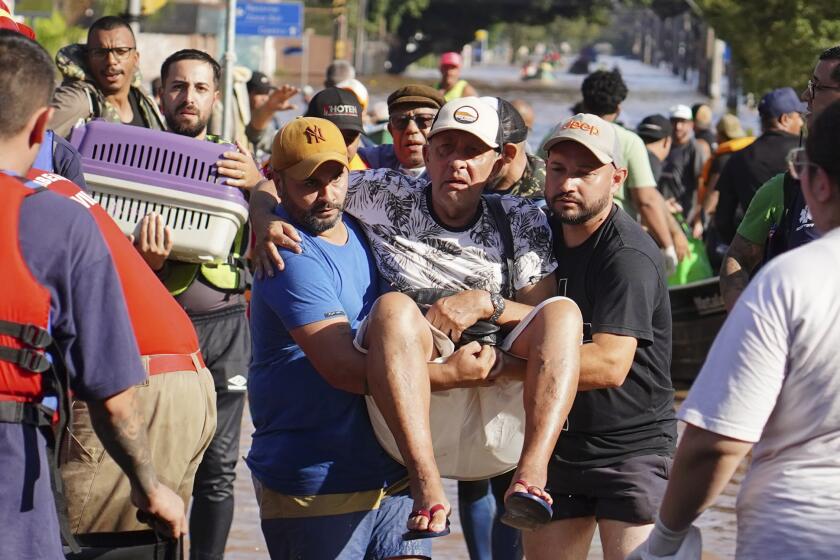Flooding in Americas, brutal heat in Asia and Africa: Extreme weather across the globe

- Share via
In sweltering Brazil, flooding killed dozens and paralyzed a city of about 4 million.
Voters and politicians in the world’s largest election, in India, are fainting in temperatures as high as 115 degrees.
A brutal heat wave has closed schools in the Philippines, caused fatalities in Thailand and set temperature records there and in Indonesia, Malaysia, the Maldives and Myanmar.
Record temperatures — especially at night, when it just won’t cool down — have hit parts of Africa.
Flooding devastated Houston, and the United States as a whole just had the second highest number of tornadoes for the month of April.
In a world growing increasingly accustomed to wild weather swings, the last few weeks have taken those environmental extremes to a new level. Some climate scientists say they are hard-pressed to remember when so much of the world has had its weather on overdrive at the same time.
“Given that we’ve seen an unprecedented jump in global warmth over the last 11 months, it is not surprising to see worsening climate extremes so early in the year,” said University of Michigan environment dean Jonathan Overpeck. “If this record pace of warming continues, 2024 will likely be a record year of climate disasters and human suffering.”
Millions of Indians across 93 constituencies are voting as Prime Minister Narendra Modi has mounted an increasingly shrill election campaign.
When the world is warmer, it is likely to have more extreme weather and climate events, including record heat and rainfall, scientists say. Climate change is also changing weather patterns, leading to rainy and hot systems stalling over areas and the jet stream meandering, said Alvaro Silva, a climate scientist at the World Meteorological Organization.
Adding to the stronger effects of human-caused climate change is a now-weakening El Niño — a natural warming of parts of the central Pacific that changes weather worldwide — that came on the heels of a three-year La Niña, its cool counterpart, Silva said.
Scientists also point to 13 straight months of record hot oceans as a potential factor in weather extremes.
While several factors play a role, “climate change is the most important one,” Silva said.
More than 80% of Porto Alegre residents don’t have running water, a week after after flooding left at least 90 people dead and more than 130 missing.
The world has constructed cities designed for 20th century temperatures and rainfall, but climate change brings more heat and downpours, said Andrew Dessler, a Texas A&M University climate scientist.
“We’re departing the climate of the 20th century right now, and we just can’t handle these events,” Dessler said. “So they’re getting slightly more extreme, but they’re passing our ability to handle them.”
Texas Tech climate scientist Katharine Hayhoe, chief scientist for the Nature Conservancy, said more extremes in more places are overlapping.
“Climate change is loading the weather dice against us in every part of the world,” Hayhoe said. “What this means is that it is increasing not only the frequency and severity of many weather extremes, but also that the risk of compound events is increasing.”
In just the first five days of May, 70 countries or territories broke heat records, said climatologist Maximiliano Herrera, who tracks temperature records across the world.
Nandyala and Kadapa in India’s southern state of Andhra Pradesh set an all-time high at 115 degrees, Herrera said. Nitin Gadkari, a federal minister, fainted during campaigning in the western Indian state of Maharashtra.
“Heat waves in India are by far the deadliest type of extreme weather events. At the same time, they are the type of extremes most strongly increasing in a warming world,” climate scientist Friederike Otto said in a statement.
This week in Southeast Asia, “it was the hottest May night ever,” Herrera posted on X. Parts of Thailand didn’t drop below 87.6 degrees.
In late April, parts of northern Thailand hit 111 degrees, while Chauk township in Myanmar’s hottest region hit a record 118.8.
Sudan has been torn by war for a year now between the military and the paramilitary Rapid Support Forces. Now a potential hunger catastrophe looms, aid groups say.
Many African nations are also facing scorching heat. Herrera said Kayes, Mali, hit 117.5 degrees. The capital of Niger had its hottest May night, and Burkina Faso’s capital had its hottest night for any month. In Chad, temperatures were lingering above 114 degrees.
The deadly heat wave across West Africa last month was linked to human-caused climate change, according to scientists at the World Weather Attribution group.
In Mexico’s Ciudad Altamirano, the temperature neared 115 degrees, amid record heat all over Latin America, Herrera said. Bolivia had its hottest May night on record and Brazil its hottest day in May.
Along with the record-setting heat in Brazil, there was a massive influx of humidity from the Amazon’s “flying rivers,” air currents that carry water vapor, said Francisco Aquino, a climatologist at the Federal University of Rio Grande do Sul. “These caused clouds to generate extreme rainfall,” he said.
The southern Brazilian state of Rio Grande do Sul is reeling from its worst flood on record, with at least 90 dead, nearly 204,000 displaced and 388 municipalities affected, according to local authorities.
In Porto Alegre, a metropolitan area with more than 4.4 million inhabitants, floodwaters took over downtown, the international airport and several neighborhoods. Authorities said it will take days for the water to recede.
Houston was drying out after days of heavy rainfall that required rescues of more than 200 people. More than 600 were rescued from flooding across Texas. Just northeast of Houston, about 23 inches of rain fell.
April brought the heaviest rains ever recorded to the United Arab Emirates, flooding portions of major highways in the desert kingdom and Dubai International Airport, the world’s busiest hub for international travel.
Associated Press writers Borenstein and Naishadham reported from Washington; Arasu from Bengaluru, India; and Maisonnave from Brasilia.
More to Read
Sign up for Essential California
The most important California stories and recommendations in your inbox every morning.
You may occasionally receive promotional content from the Los Angeles Times.













